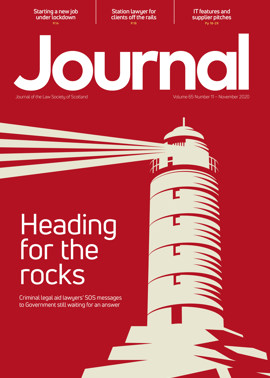From people talk to system talk

Collaboration delivers innovation: Sarah Blair
We’re all becoming a bit tired of overused phrases these days. We hear about the circumstances we find ourselves in as being “unprecedented”, and we are bombarded with articles considering the “new normal”. For a long time firms have been seeking that holy grail of “innovation”. In the legal technology space, where I spend much of my time, commentators are debating how much “digital transformation” has happened in the past six months compared to the many years beforehand.
Whether you think that the “pivot” (there goes another one) to using videoconferencing and digital signatures constitutes digital transformation or not, it is clear that we have all found ourselves faced with many challenges during this pandemic: how to communicate with and serve our clients best when seeing them in the flesh is not possible, and how to digitise processes long wedded to paper and physical documents. Most firms have risen to this challenge admirably and continued to deliver excellent services to their clients through difficult times. This challenge has been shared by key stakeholders such as Scottish Courts & Tribunals Service (SCTS) and Registers of Scotland – themselves forced initially to close down operations completely, and then faced with the need to digitise these operations as quickly as possible.
An optimist like myself would also see these challenges as potential opportunities, where the hand of many has been forced and barriers to change removed through sheer necessity.
One particular area of opportunity is around interoperability of systems in the legal space. Where in our personal life you can often select an integration between two apps with a sideswipe, integrations and data sharing across legal processes and systems is limited and often complex. On the LawScotTech board, we have recognised this as one of the challenges faced by the profession, and early work has started to look at how we can improve this in various ways, including exploration around an API (application programming interface) framework and a set of data standards.
Talking and sharing
When the Civil Online portal was launched, initial enthusiasm for a digital solution at my own firm turned to frustration at yet another system without interoperability capabilities, and when met with the inefficiencies of rekeying data, we were among those who did not adopt it. We opened an early dialogue with the team regarding this, which developed into participation in the discovery phase to explore further.
We continued this discussion through the early stages of the pandemic and were pleased to be invited to ongoing discussions around the API and then into the beta programme.
From the early stages of the beta, it was refreshing to see such open and interactive collaboration between all parties. Participating firms were consulted on areas such as authentication methods, and I was able to share both the insights of my own firm on this, but also those of solutions providers and other member firms to ensure we made decisions which would ensure that the API is accessible to smaller firms through standard integrations via their supplier. We had regular check-in meetings, and queries and issues were answered or resolved quickly (and worked out together). We were able to submit our first cases to the sandbox within six weeks of starting the project and were ready to submit live cases quickly thereafter.
To go back to some of those overused phrases, one definition of innovation describes it as “the execution of ideas which address challenges and deliver value for the firm and its clients”. And Thomas Malone of MIT in Massachusetts said a few years ago that “some of the most important future innovations will not come from new technologies, but from new forms of collaboration”.
The Civil Online project is only one part of a broader SCTS digital strategy which has been fast tracked due to COVID-19. Given that Civil Online is becoming mandatory for submission of simple procedure cases, it is encouraging that feedback is welcomed and the API has been developed collaboratively. When we consider the challenges still ahead of us, this project has helped increase my optimism for the future. The increasingly collaborative approaches being adopted by SCTS and RoS to work with bodies like the Law Society of Scotland and firms
of all sizes are required if we are to hope for transformation across the sector, and innovations which will deliver true value to firms and their clients.
Formula for success: Douglas Hanley
In May, just after lockdown, the new SCTS director of Digital Services, Mike Milligan, brought me on board, into a new and visionary team set out with a clear mission to deliver the ambitious change set out within the SCTS digital strategy.
The impact of the COVID-19 pandemic quickly dictated our priority to respond and recover: it was essential to keep the wheels of justice turning. However, despite the enormous and almost instant impact of the pandemic, our Digital Services team was able to grow and galvanise quickly, demonstrating creativity in their innovations to deliver quality new digital technologies at a pace that was urgently needed.
The requirement for physical distancing and the need to reduce physical attendance at courts galvanised a move to virtual remote hearings where possible. A large number of SCTS staff went from being based in buildings to working from home, and there was a need to shift the dependency on physical documents (and their transport) to their electronic equivalents.
That was the backdrop to becoming involved with the Civil Online service. The Civil Online portal had been live for simple procedure for some time, and the barrier to its widespread adoption by solicitor firms was known. A “discovery phase” had identified that the portal approach was unattractive to solicitors as it involved a rekeying of data from their case management systems into the portal. It was confirmed that if an API were to be made available for Civil Online, firms could integrate directly for claim submission, avoid rekeying and prefer electronic submission to couriered case files. By my arrival, an “alpha phase” had been completed with a delivery partner that identified the minimal RESTful functionality to allow this.
The continued challenges presented by COVID-19 had motivated the introduction of new secondary legislation to mandate the use of electronic submission of claims in preference to paper. Pressure was mounting to make a production-grade API available for beta participants that would represent a significant amount of simple procedure business across Scotland, as soon as possible – weeks rather than months. Under Mike Milligan, Digital Services were seeking to grow in-house capability and adopt a more agile approach to change, and as I’d led initiatives like this in the past, we decided to change tack and, rather than work with delivery partners, quickly assemble an in-house development team and get to work.
Blueprint for the future
From the beginning, it was clear that the success of the project would be defined by having working end-2-end integrations across all beta participants. We resolved to be as collaborative as possible. We checked in with firms individually to see if they would be happy to work openly on this beta, be part of a collaboration platform, meet regularly, share learnings and report progress to the mutual benefit of programme members. All six firms participating were delighted with the idea and signed up to the approach. The key ingredients that proved successful to the collaboration included:
- 1-2-1 sessions with each firm to introduce the proposed technical approach to the API and the principles of collaboration, listening to feedback and making early adjustments;
- a beta kick-off to introduce all participating firms, share timelines and technical specs and agree ways of working together;
- a weekly “all hands” to update on progress within SCTS and hear how preparations were advancing across firms;
- use of Microsoft Teams to provide a global collaboration team for exchange with all firms and dedicated channels for sidebar (but open) conversations with firms that needed a deep dive on a particular topic;
- early availability of a “sandpit” environment that provided a stubbed-out API to allow firms to get acquainted with the integration scope while SCTS built out the backend of the API.
Broadly speaking, the SCTS team mobilised from a standing start and delivered the Civil Online API within eight weeks. Similarly, from various starting points, it feels like all firms managed to implement their integrations within about eight weeks. I think the speed and success was based on the adoption of a collaborative and agile approach with the willingness of all parties to openly communicate and discuss issues as we travelled towards a common goal.
We now have all six firms electronically submitting simple procedure claims in courts across Scotland every day. We can accommodate any other firms who wish to participate, with setup in a matter of days using a well documented onboarding process. I think this API based integration was a huge success in dealing with the COVID-19 challenges, but also a success as a blueprint for how SCTS Change and Digital Services should continue to digitally enable integration with law firms and the wider justice system.
Regulars
Perspectives
Features
Briefings
- Civil court: keeping justice on the rails
- Employment: Time for a redundancy refresher
- Family: Watch your step with behaviour-based divorce
- Human rights: Inner House message in privacy group chat
- Pensions: The future – the regulator's blueprint
- Scottish Solicitors' Discipline Tribunal
- Crofting law reform: time to act
- In-house, online and in demand
In practice
- Paralegals: 10 years of recognition
- Ask Ash: Too busy, but still insecure
- Property pitfalls: problematic but preventable
- The Word of Gold: Count us out
- Prepare for the tax due date
- The Eternal Optimist: Help to turn the corner
- Appreciation: Ross Paton
- Appreciation: Claire Reilly (Robertson)
- Tenancies succession reminder







